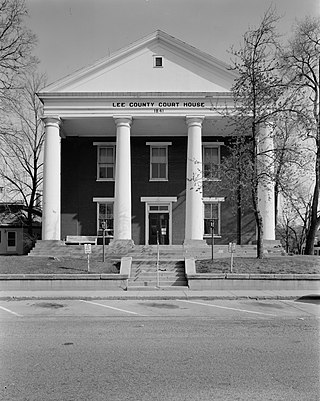
Lee County is the southernmost county in the U.S. state of Iowa. As of the 2020 census, the population was 33,555. The county seats are Fort Madison and Keokuk. Lee County is part of the Fort Madison–Keokuk, IA-IL-MO Micropolitan Statistical Area.

Fort Madison is a city and a county seat of Lee County, Iowa, United States along with Keokuk. Of Iowa's 99 counties, Lee County is the only one with two county seats. The population was 10,270 at the time of the 2020 census. Located along the Mississippi River in the state's southeast corner, it lies between small bluffs along one of the widest portions of the river.

Black Hawk, born Ma-ka-tai-me-she-kia-kiak, was a Sauk leader and warrior who lived in what is now the Midwestern United States. Although he had inherited an important historic sacred bundle from his father, he was not a hereditary civil chief. Black Hawk earned his status as a war chief or captain by his actions: leading raiding and war parties as a young man and then a band of Sauk warriors during the Black Hawk War of 1832.
The Iowa State Penitentiary (ISP) is an Iowa Department of Corrections maximum security prison for men located in the Lee County, Iowa, community of Fort Madison. This facility should not be confused with the Historical Iowa State Penitentiary, which was shut down in 2015 after being open for 175 years. The HISP itself was a 550-person maximum security unit. Also on the complex was a John Bennett Correctional Center - a 169-person medium security unit. The HISP included two minimum-security farms with about 170 people who were located within a few miles of the main complex. The complex also had a ten-person multiple care unit, and a 120-bed special-needs unit for prisoners with mental illness or other diseases that require special medical care. In total, there were about 950 inmates and 510 staff members.
Holy Trinity Catholic High School or Holy Trinity Catholic Secondary School may refer to:
Lee County Courthouse may refer to:
Holy Trinity Catholic Schools is a PK-12 Roman Catholic school headquartered in Fort Madison, Iowa, with campuses in Fort Madison and West Point. Fort Madison has the secondary school campus and one early childhood campus, while West Point has the elementary school and an early childhood center on another campus. The school system is located in the Roman Catholic Diocese of Davenport.
James Stewart Youel was an American football quarterback in the National Football League for the Washington Redskins and Boston Yanks. Born in Vinton, Iowa, he played college football at the University of Iowa.

Denmark is an unincorporated community and census-designated place in northeastern Lee County, Iowa, United States. It lies along Iowa Highway 16, north of the city of Fort Madison, the county seat of Lee County. Its elevation is 722 feet (220 m) above sea level. Although Denmark is unincorporated, it has a post office with the ZIP code of 52624, that opened on April 7, 1846. The town also has a branch of Farmers Savings Bank that opened in 1935. The community is part of the Fort Madison–Keokuk, IA-MO Micropolitan Statistical Area. As of the 2020 census, its population was 425.
Preservation Iowa, formerly called the Iowa Historic Preservation Alliance (IHPA), was founded in 1989 by members of the public concerned about the destruction of significant historic sites and buildings in the state of Iowa.
Madison Historic District may refer to:

Iowa is a state in the Midwestern region of the United States, bordered by the Mississippi River to the east and the Missouri River and Big Sioux River to the west. It is bordered by six states: Wisconsin to the northeast, Illinois to the east and southeast, Missouri to the south, Nebraska to the west, South Dakota to the northwest, and Minnesota to the north.
Fort Defiance State Park is a state park of Iowa, USA, in Emmet County. The park is 191 acres (77 ha) and sits at an elevation of 1,453 feet (443 m). The park, which was built by the Civilian Conservation Corps during the Great Depression, was opened to the public in 1930. Fort Defiance State Park is open for year-round recreation including picnicking, hiking, and camping.

The Lee County Courthouse is located in Fort Madison, Iowa, United States. The courthouse serves the court functions and county administration for the northern part of Lee County, and it is the county's first courthouse. It was listed on the National Register of Historic Places in 1976 as a part of the County Courthouses in Iowa Thematic Resource. In 2014, it was included as a contributing property in the Park-to-Park Residential Historic District. Southern Lee County is served from a courthouse in Keokuk in the former Federal Courthouse building.

U.S. Highway 61 (US 61) is a United States Highway that serves eastern Iowa. It enters the state from Missouri near Keokuk with US 136. North of Keokuk, it is overlapped by US 218 for a few miles. It the follows the course of the Mississippi River past Montrose and Fort Madison. It meets US 34 at Burlington. It passes through Wapello and bypasses Muscatine and Blue Grass on its way toward Davenport. There, it follows Interstate 280 (I-280) and I-80 around the Quad Cities. North of Davenport, it follows a freeway north toward DeWitt where it meets US 30. The highway continues north through Maquoketa and reaches the Dubuque area. There it is joined by US 151 and briefly by US 52. The two highways enter the downtown area on an expressway. Due to the proximity of the Mississippi River and railroad tracks that lie between, the routes have an indirect junction with US 20. The two highways leave the state and enter Wisconsin about one-half mile (800 m) north of the Illinois–Wisconsin state line.
Fort Madison station might refer to the following stations in Fort Madison, Iowa:

Virginia Harper was a civil rights activist known for her work against the rerouting U.S. Highway 61 (US 61) through the Mexican-American and Black neighborhoods of Fort Madison, Iowa.
This page is based on this
Wikipedia article Text is available under the
CC BY-SA 4.0 license; additional terms may apply.
Images, videos and audio are available under their respective licenses.






